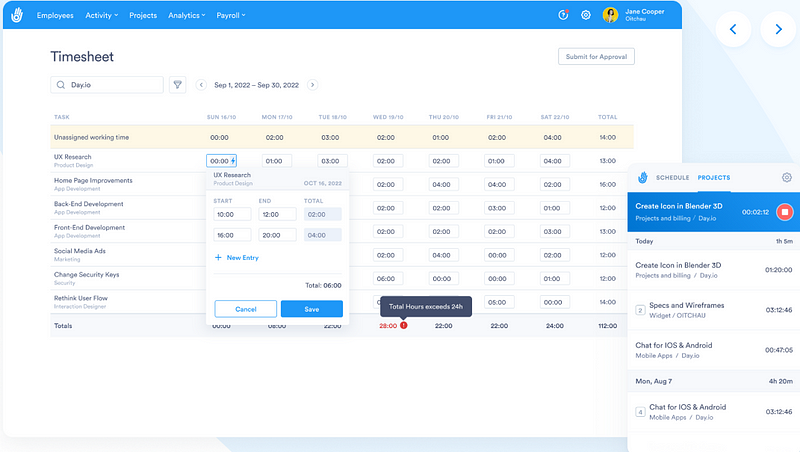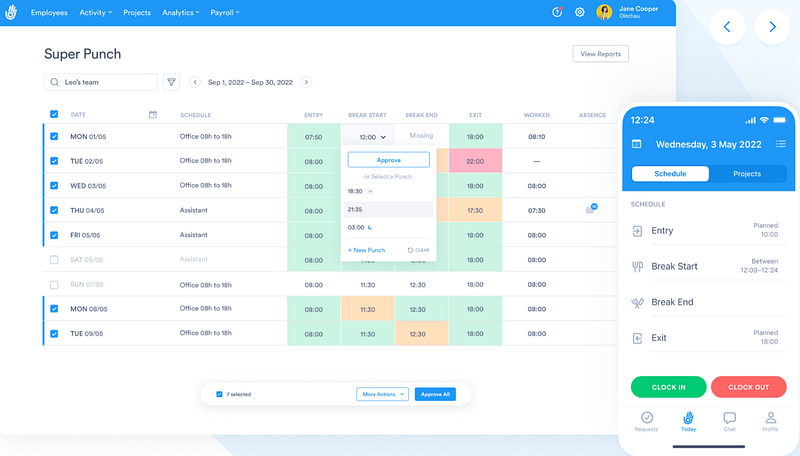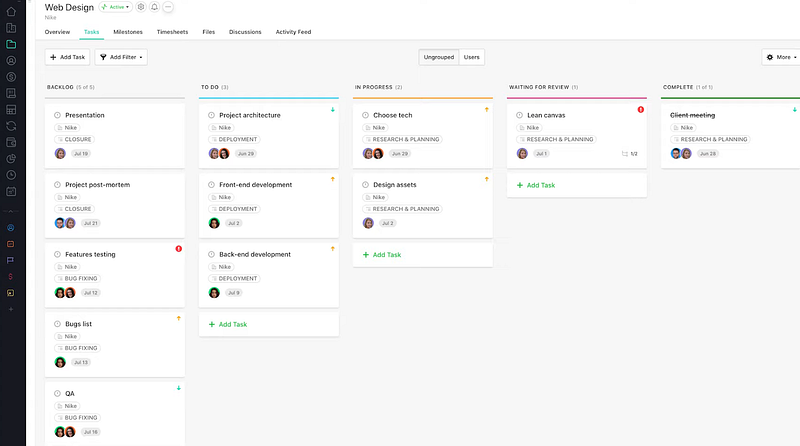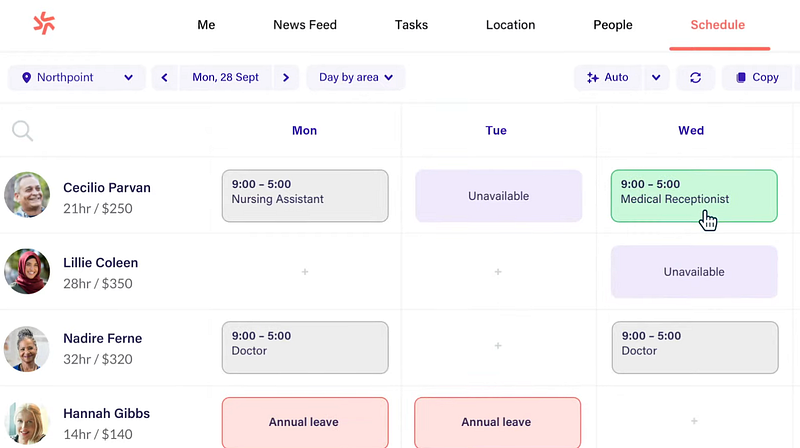Time tracking is a necessity for freelancers, small businesses and remote teams. Knowing how much time you invest in individual projects or tasks enables the efficient management of resources and optimizes workflow.
Yet when it comes to billing clients, there’s an extra layer of complexity: Not only do you need to track the amount of time spent working but also which activities are chargeable so that you can accurately invoice them.
In this article, we’ll explain what billable time is and why it’s important to track it accurately; provide step–by–step instructions on how to do so; offer some tips for getting it right; and list some of the best billable time tracker apps that can help stay on top of your billing game.

What is Billable Time?
Time that can be charged to a client or customer is referred to as billable time. This involves the professional’s work on tasks directly relevant to a project or job and for which they will receive payment.
Billable time may take various forms, such as an hourly rate, flat fee for a specific task or project, or even expenses incurred during the project (e.g., travel and materials).
What Activities are Billable?
Below are some common activities that can be billed:
- Carrying out core tasks associated with the assignment
- Providing direct services for a client project
- Compiling data and information on behalf of the client or project
- Participating in meetings that have an impact on the project at hand
- Answering emails pertaining to the project
- Generating creative ideas related to the project
- Making adjustments as per requests from clients
- Meeting with customers to arrange objectives and deadlines for the task
Time–tracking is essential for many professionals; it enables them to accurately bill clients, monitor project costs and guarantee they are fairly compensated for their work.
Billable Time vs Non-billable Time: Differences
Professionals bill clients for the time spent on tasks related to projects or jobs, such as client meetings, research, design and production.
To do this, freelancers usually track billable time using a timesheet or time tracking software before invoicing the client based on an agreed–upon hourly rate or project fee.
Non–billable time refers to work that is not directly related to a client’s project or job, such as administrative work, business development, training and personal development. These tasks are often unpaid but can be just as important for independent professionals looking to grow their businesses!
Non–billable time is essential for the smooth functioning of a business; however, it cannot be invoiced to the client since it does not add any direct monetary value.
Challenge of Differentiating Billable Time from Non-Billable Time
Determining which hours are billable and which aren’t can be a tricky task for freelancers and small businesses. While it may seem tempting to include all of your work in an invoice, this could result in overcharging the client.
Keeping a Distinction Between Billable and Non-billable Time
Maintaining a clear demarcation between billable and non–billable activities is essential for accurate time tracking and billing. To ensure this, pay close attention to the amount of time spent on each task while documenting all tasks accurately – avoiding any confusion at invoicing stage.
Balancing Billable and Non-billable Time
Professionals face the challenge of managing their non–billable time efficiently, so as not to diminish their billable hours or reduce their income. Striking a balance between focusing on billable tasks and investing in non–billable activities that are crucial for business growth is key.

Maintaining Transparency is Critical
Professionals may sometimes choose to invoice for a portion of their non–billable time, such as when attending a client meeting that involves both billable and non–billable topics. It is essential to be transparent with the client about how this billable time is calculated in order to avoid any potential disputes or confusion.
Why Should You Track Billable Time?
Tracking billable hours and maintaining a timesheet is essential for the success of your business. Not only does it provide an accurate record of how much time has been spent on projects, but also helps to ensure that you are being properly compensated for your efforts.
Accurate Invoicing
When preparing your invoice, calculating the number of hours spent on the project with precision is essential for tracking billable time and ensuring that nothing slips through the cracks.
Advanced billable time apps like Day.io let you easily create professional invoices based on your tracked time, so you can get paid quickly and accurately.
Determining Project Viability
By monitoring the time invested in each project, you can gain insight into its costs and profitability. This will enable you to decide which projects are worth pursuing and which should be avoided.
On many occasions, the billable time for a particular project may be higher or lower than expected; in such cases, it’s essential to evaluate if continuing with the project is a good idea or if renegotiating your terms with the client is necessary.
Evaluating Performance
Monitoring billable hours is an effective way to measure productivity, evaluate the efficiency of your team and ensure deadlines are adhered to.
By tracking how many billable hours each team member spends on a project, you can identify any weak spots in the workflow and take corrective action to improve productivity.

Calculating Efficiency
As a manager or startup owner, you are no doubt focused on maximizing the efficiency of your team. Tracking billable time can provide valuable insight into how efficiently your team is operating and enable you to identify opportunities for increasing productivity.
Increasing Revenue
Accurately tracking the time spent on a project allows you to identify areas for billing optimization and rate adjustments based on actual work done. Additionally, this data gives you an opportunity to upsell services or offer discounts when working with larger projects.
Improving Team Management
Keeping tabs on the billable hours your team members expend per project can help you pinpoint where they may require additional instruction or supervision. This, in turn, will allow you to allocate resources more effectively and improve productivity and profitability.
How to Track Billable Time?
Having now gained insight into the advantages of tracking billable time, let’s examine some effective methods to do so. Here is a step–by–step guide for you to consider.
Step 1: Agree with an Invoicing Schedule
Agreeing on an invoicing schedule with your clients is the first step. Decide when and how often you’ll send them invoices for work done, such as weekly or monthly if they’re paying by hour.
Step 2: Use an Online Time Tracker
Time–tracking apps make monitoring your billable hours a breeze. With stopwatch, timer and project management tools, you can effortlessly record the duration of each task or job. Additionally, they let you categorize work as either billable or non–billable so that at a glance you know how much time is invoiced for any given client or assignment.

Step 3: Use Real-time Tracking
Real–time tracking is an invaluable tool for keeping tabs on billable time. Utilize a time tracking app or software that logs the amount of hours you spend working on projects and tasks as they happen. This allows you to quickly identify how much time was invested in each activity, ensuring you accurately invoice your clients for their due payments.
Step 4: Track Subtasks and Multiple Projects for Each Client
If you have multiple jobs for the same customer, it is essential to monitor each project independently. This will assist you in monitoring your time and effort spent on every task and assignment. Additionally, ensure that tasks are divided into subtasks so that accurate billing of your time can be calculated for each activity.
Step 5: Don’t Forget Non-billable Hours
Bear in mind that not all hours spent on a project or task can be billed. Non–billable time includes administrative tasks, research, training, marketing and sales activities, customer service etc.; although these are essential to your job, they should not be charged to the client.
Step 6: Compile a List of Billable Tasks
It is essential to establish a comprehensive list of billable tasks when working with a client on an extended project. This will ensure both parties are aware of what is and isn’t included in the agreement, avoiding any potential billing conflicts down the line.
Step 7: Create an Invoice
Once you’ve tracked all of your billable time, it’s time to create an invoice. This should include the total amount of hours spent and the rate for each task. If you have a billing agreement in place with a client, make sure that this is included on the invoice too.
Forgo the outdated methods of creating an invoice and instead take advantage of advanced online timekeeping tools like Day.io to create sleek, professional–looking invoices and timesheets in a fraction of the time.
Top Billable Time Tracker Apps
Time tracking tools and software can help you easily monitor your billable hours. Popular options include:
1. Day.io – Best Overall All-in-one Billable Time Tracker App
Day.io is the ultimate time tracking and billing application for remote teams and businesses of all sizes. Track billable hours with detailed timesheets that show how much time was spent on each individual project or task, without having to repeat yourself.

You can also set up custom rate cards to accurately calculate how much you should be billing clients for your services. Plus, Day.io integrates with many popular accounting and CRM software so that invoices generated based on your tracked data can be quickly synced.
Features
- Time clock to record time spent on tasks and projects
- Timesheet for tracking and invoicing billable hours
- Real-time updates with notifications when tasks are completed or started
- Integrations with other software like Quickbooks, Xero accounting systems
- Employee self-service portal for timesheet approvals, leave requests etc.
- Project management to track task progress, deadlines, budgets, and resources
- Task tracking for easy monitoring of long-term goals
- Employee scheduling for assigning tasks or shifts
- Overtime alerts for managing labor costs
- Dashboard reports to analyze utilization rates over time
- Job costing analysis based on billable hours
- Mobile app for tracking time and expense on the go
- Client billing to set up invoices, payment terms and discounts
- Automatic reminders for employees to submit timesheets or approve them
- Flexible customization options for customizing features as needed
Pricing
Day.io project time tracking starts from $6 per user/month.
2. Paymo – Best for Generating Invoices
Paymo is an app that makes it easy to track your time and generate invoices for billing. With Paymo, you can create tasks with detailed descriptions and set start/end dates, assignees, expected hours to complete the task, billing type (time-based, flat rate or non-billable), estimated prices, etc.

Plus, you have access to several helpful features such as timers in the web app and downloadable apps that track all your activity throughout the day so you can easily categorize your time and associate it with existing projects and tasks.
Features
- Integrated one-button time tracking functionality
- Project budgeting and forecasting
- Ability to integrate with other popular business apps like Google office, Slack, Zapier and JotForm.
- Detailed reports of project progress and profitability
- Invoicing reminders for clients
- Option to add taxes in invoices
- Discounts, credits and deposits features
- Automatic currency conversion on invoices
- Possibility to send estimates before the actual invoice generation.
- Customizable templates for invoice creation
Pricing
- Free: $0
- Starter: $5.95 per user/month
- Small Office: $11.95 per user/month
- Business: $24.95 per user/month
3. Deputy – Best for Managing and Planning Schedule
Deputy is an excellent app for managing and planning schedules to help you with billable time management. Whether you’re a business owner with multiple locations or an individual looking to organize their day, Deputy has you covered.

With its intuitive interface and robust features, users can quickly create employee databases, assign jobs to various locations, access Google Maps integration on shifts, and import existing personnel data from payroll providers and POS software.
Features
- Automated time tracking to accurately capture employee hours worked
- Employee Scheduling capabilities with drag-and-drop shifts
- Generate invoices on demand based on accurate time tracking data
- Robust reporting tools to analyze workforce utilization
- Advanced Leave Management features
- Employee Self-Service Portal
- Customizable alerts & notifications
- Integration with third-party systems such as accounting software for seamless synchronization of data in real-time
- Connectivity with mobile devices
Pricing
- Premium: $4.90 per user/month
- Scheduling: $3.50 per user/month
- Time & attendance: $3.50 per user/month

Wrap-Up: Track Your Billable Time Effectively
Monitoring your billable hours can be tedious, but it is essential for staying organized and ensuring you are adequately compensated.
This guide will help you understand how to efficiently track your billable time. With the help of some of the best billable time apps, such as Day.io, you can revamp your tracking experience today and ensure that all your hard work is accurately accounted for and compensated accordingly.
